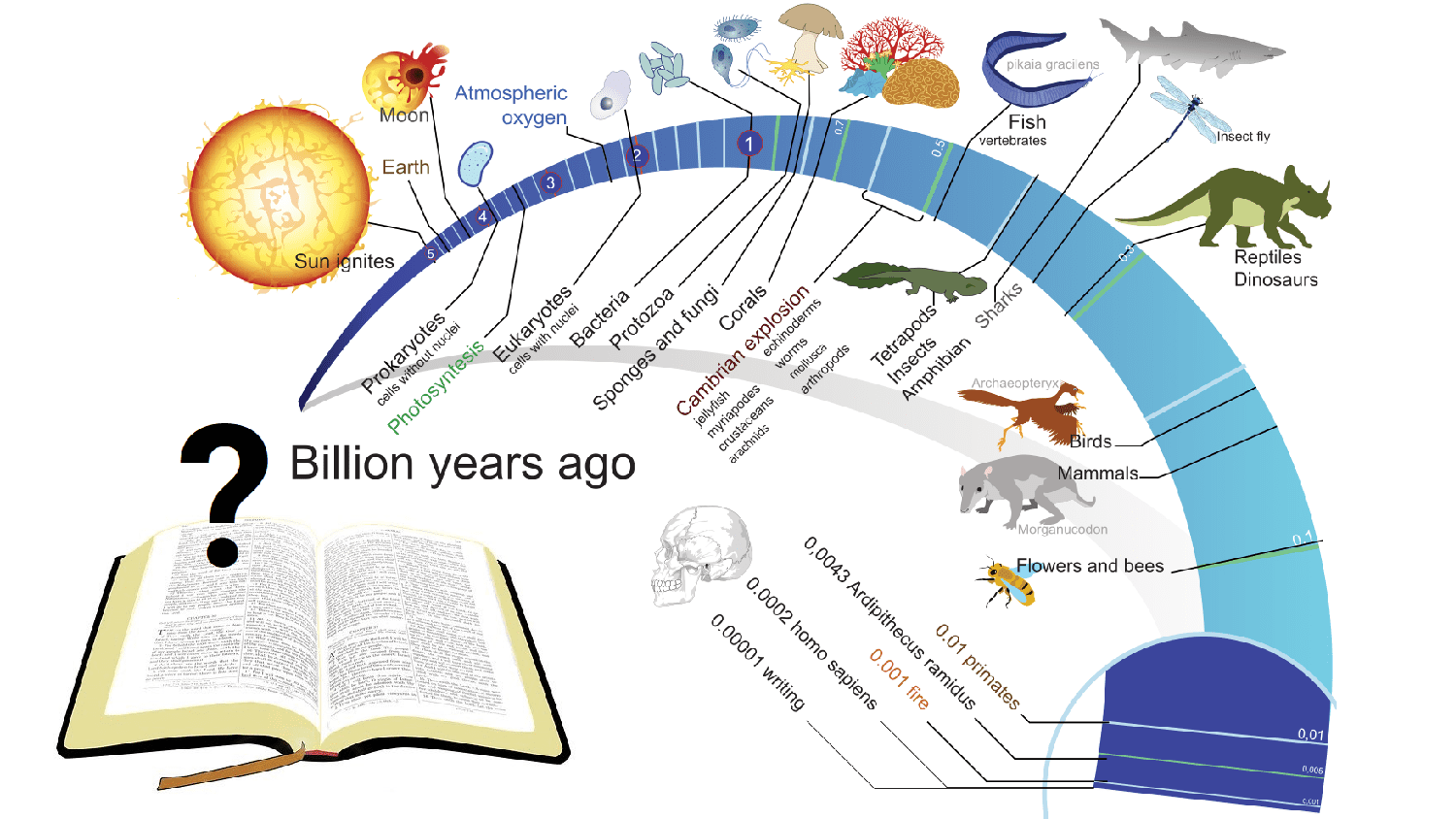[Originally published as the first part of False History of Creationism is Full of Beans]
Our critic this week is Phil Vischer, the original creator of VeggieTales. Phil apparently does not accept the history recorded in Genesis and seems unaware of the science that confirms creation and the biblical timescale. He recently made some remarks on Twitter that are demonstrably false. Here are Phil’s comments in bold text, with my responses:
Phil: Interesting response from Ken Ham to our Evangelical History. It’s a little odd that a man who has spent his life persuading Christians to reject mainstream science is complaining that I said he rejects mainstream science.
Lisle: I have known Ken Ham for many years and have never heard him say, or seen him write, anything that is contrary to any fact that has been established by the scientific method. So, I challenge Phil to produce some evidence to back up his accusation. Namely, can Phil produce one scientific fact (something that is testable, observable, and repeatable in the present, and hence follows the scientific method) that Ken Ham denies or persuades others to deny?
Could it be that Phil has been fooled by the secular rhetoric into believing that evolution and/or deep time are somehow “scientific” ideas? If so, then maybe he should spend a little more time learning from Ken Ham and AiG’s team of Ph.D. scientists about the differences between operational science and stories about the past.
Phil: My response to him was to point out the video was about the differences between Fundamentalism and Neo-Evangelicalism, and that his particular strain of scientific theory (YEC) was never adopted by Neo-Ev leaders or institutions. It is a truly Fundamentalist development.
Lisle: The biblical timescale is certainly not a Fundamentalist development, as anyone who has studied history knows. The concept of a “young earth” (thousands, not billions of years old) has been held by believers for millennia. For example, the fact that God created the universe in six days and rested one day (and that this is reflected in our 7-day week) was written by God’s own finger in stone at Mount Sinai (Exodus 20:8-11; Deuteronomy 9:10) and this happened around 1500 B.C. Throughout church history the biblical timescale was embraced by the overwhelming majority of Christians.
What Phil means by “Neo-Evangelical leaders or institutions” not accepting a “particular strain of scientific theory” isn’t entirely clear to me. If we take the word “evangelical” in its classical sense of having a heavy emphasis on evangelism and the necessity of repentance and faith in Christ, then many evangelical leaders and institutions do indeed embrace the scientific evidence that confirms the literal history of Genesis. The scientific evidence for biblical creation and a global flood is absolutely overwhelming, such that there is no excuse for Christians to deny these Scriptural truths.
Phil: What’s even more interesting is that of the 90 essays defining Fundamentalist belief in the 1910s, zero of them proposed a young earth.
Lisle: The Fundamentals: A Testimony to the Truth is a collection of 90 essays written between 1910 and 1915, and is by multiple authors with multiple views. Some of them (such as James Orr) argued against the literal history of Genesis and openly embraced deep time and/or theistic evolution. This is hardly surprising since deep time and evolution were very fashionable in academia at the time (as they are today).
Nonetheless, the majority of authors who addressed the issue affirmed and argued that Genesis is literal history and denied evolution, in contradiction to Orr’s view. A literal historical Genesis necessarily entails a young earth. However, the concept of deep time had become so entrenched in the church by 1910, that most scholars accepted it. Hence, many of those who defended a historical Genesis inconsistently also held to deep time, apparently unaware of the contradiction or the theological problem of death before sin.
Most of the authors of The Fundamentals did not comment on the age of the earth; however, they argued strongly for the historicity of Genesis.
For example, in the first chapter of volume three, Dr. James M. Gray, who was Dean of Moody Bible Institute at the time, argued that “The inspiration of scripture includes the whole and every part of it.”¹ That necessarily includes the history of Genesis. He states,
Furthermore, are not the historical books in some respects the most important in the Bible? Are they not the bases of its doctrine? Does not the doctrine of sin need for its starting point the record of the fall? … Thus without going further, we may say, with Dr. DeWitt of Princeton, that it is impossible to secure the religious infallibility of the Bible—which is all the objector regards as necessary—if we exclude Bible history from the sphere of its inspiration. But if we include Bible history at all, we must include the whole of it, for who is competent to separate its parts?²
William Caven agrees,
When Christ makes reference to Old Testament narratives and records, He accepts them as authentic, as historically true. He does not give or suggest in any case a mythical or allegorical interpretation. The accounts of the creation, of the flood, of the overthrow of Sodom and Gomorrah, as well as many incidents and events of later occurrence, are taken as authentic.”³
Phillip Mauro states,
It is useless to pretend that Darwin’s theory might be true, and the Bible nevertheless entitled to respect. The Lord Jesus said to a learned man of His day, ‘If I have told you earthly things, and ye believe not, how shall ye believe if I tell you of heavenly things?’ (John 3:12). If the Bible does not give us a truthful account of the events of the six days recorded in its first chapter, it is not to be trusted as to any of its statements.4 (emphasis added)
But surely none of these authors will explicitly confirm the biblical timescale of thousands of years, will they?
Dr. George Bishop states,
“We open the first pages of the Bible,” says Vallotton, “and we find there the recital of the creation of the world by the Word of God—of the fall of man, of his exile far from God, far from Paradise, and far from the tree of life. We open the last pages of the last of the 66 books dating 4,000 years later.”5 (emphasis added)
Yes, Bishop, (quoting Vallotton) refers to the timespan between Creation and the New Testament books (written ~2000 years ago in the first century A.D.) as 4000 years. At minimum, this indicates that the 6000-year timescale was known at this time, even though it was unpopular.
The reasons for rejecting the historicity of Genesis are due to outside influences and not a proper exegetical reading of the text. This is explained by Professor J.J. Reeve, who states,
They give more credence to the guesses of some so-called scholar, a clay tablet, a heathen king’s boast, or a rude drawing in stone, than to the Scripture record. They feel instinctively that to accept the Bible statements would be the ruin of their hypothesis, and what they call their hard-won historical method. In this their instinct is true. The Bible and their hypothesis are irreconcilable. As their theory must not be interfered with, since it is identical with the truth itself, the Bible must stand aside in the interests of truth. For this reason they deny all historicity to Genesis 1-11, the stories of Creation, the Fall, the Flood, etc. No theory of naturalistic evolution can possibly admit the truth of these chapters.”6,7 (emphasis added)
More importantly, can the text of Scripture accommodate Darwinian evolution and/or deep time? The answer of course is no. None of the biblical authors treated the timescale of creation as anything other than six (literal) days, each comprised of one evening and one morning. This was unquestionably the dominant position of the church throughout its history.
Footnotes:
- Gray, J, The Fundamentals, Vol. 3, Chapter 1, p. 12
- Ibid, p. 12-13
- Caven, W., The Fundamentals, Vol. 4, Chapter 11, p .50
- Mauro, P., The Fundamentals, Vol 5, chapter 1 p. 27
- Bishop, G., The Fundamentals, Vol. 7, Chapter 3, p. 42
- Reeve, J.J., The Fundamentals, Vol. 3, Chapter 6, p. 105
- Reeve also states, “Falsehood will not do God’s will; only truth can do that. Is there nothing in the story of creation, of the fall, the flood, the call and promise to Abraham, the life of Jacob and Joseph and the great work of Moses? If all these things are not true to fact or to life, then God has been an arch-deceiver and acts on the Jesuit maxim, ‘The end justifies the means.’” p. 115-116.







